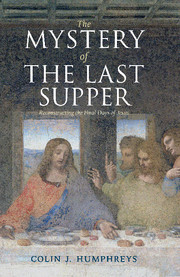Book contents
- Frontmatter
- Contents
- List of illustrations
- Foreword by I. Howard Marshall
- Acknowledgements
- 1 Four mysteries of the last week of Jesus
- 2 Dating the crucifixion – the first clues
- 3 The problem of the last supper
- 4 Can we reconstruct the Jewish calendar at the time of Christ?
- 5 The date of the crucifixion
- 6 The moon will be turned to blood
- 7 Did Jesus use the solar calendar of Qumran for his last supper Passover?
- 8 Does ancient Egypt hold a key to unlocking the problem of the last supper?
- 9 Discovering the lost calendar of ancient Israel
- 10 Was the lost ancient Jewish calendar used in Israel at the time of Jesus?
- 11 The date of the last supper: the hidden clues in the gospels
- 12 From the last supper to the crucifixion: a new analysis of the gospel accounts
- 13 A new reconstruction of the final days of Jesus
- Notes
- Bibliography
- Index of biblical and other ancient sources
- General index
8 - Does ancient Egypt hold a key to unlocking the problem of the last supper?
Published online by Cambridge University Press: 03 May 2011
- Frontmatter
- Contents
- List of illustrations
- Foreword by I. Howard Marshall
- Acknowledgements
- 1 Four mysteries of the last week of Jesus
- 2 Dating the crucifixion – the first clues
- 3 The problem of the last supper
- 4 Can we reconstruct the Jewish calendar at the time of Christ?
- 5 The date of the crucifixion
- 6 The moon will be turned to blood
- 7 Did Jesus use the solar calendar of Qumran for his last supper Passover?
- 8 Does ancient Egypt hold a key to unlocking the problem of the last supper?
- 9 Discovering the lost calendar of ancient Israel
- 10 Was the lost ancient Jewish calendar used in Israel at the time of Jesus?
- 11 The date of the last supper: the hidden clues in the gospels
- 12 From the last supper to the crucifixion: a new analysis of the gospel accounts
- 13 A new reconstruction of the final days of Jesus
- Notes
- Bibliography
- Index of biblical and other ancient sources
- General index
Summary
Now the length of time the Israelite people lived in Egypt was 430 years.
(Exodus 12:40)As we have seen in the previous chapter, a different calendar theory is, in principle, an attractive way of explaining the apparent discrepancies between the synoptics and John concerning the date and nature of the last supper. However, the only 'different calendar' that has had any real support from scholars is the Qumran solar calendar and I have just shown conclusively that Jesus could not have used this calendar to celebrate his last supper as a Passover meal. So it seems we are no further forward in trying to understand the apparent disagreement between the synoptics and John on the last supper.
As I thought about this problem I tried to update it in my mind. Why do the Eastern Orthodox churches celebrate Easter on a different date from Catholics and Protestants? It is because Catholics and Protestants use the modern Gregorian calendar, but Eastern Orthodox Christians continue to calculate the date of Easter using the Julian calendar, which existed before the Gregorian calendar (see Chapter 2), because they have always celebrated Easter in the Julian calendar in their tradition. So in order to solve the date of the last supper problem in John and the synoptics, should we be looking for an ancient Jewish calendar that existed before the official Jewish calendar at the time of Christ, which a Jewish group (or groups) might have continued to use at the time of Christ to celebrate Passover, because they had always celebrated Passover in this calendar in their tradition?
- Type
- Chapter
- Information
- The Mystery of the Last SupperReconstructing the Final Days of Jesus, pp. 110 - 120Publisher: Cambridge University PressPrint publication year: 2011



